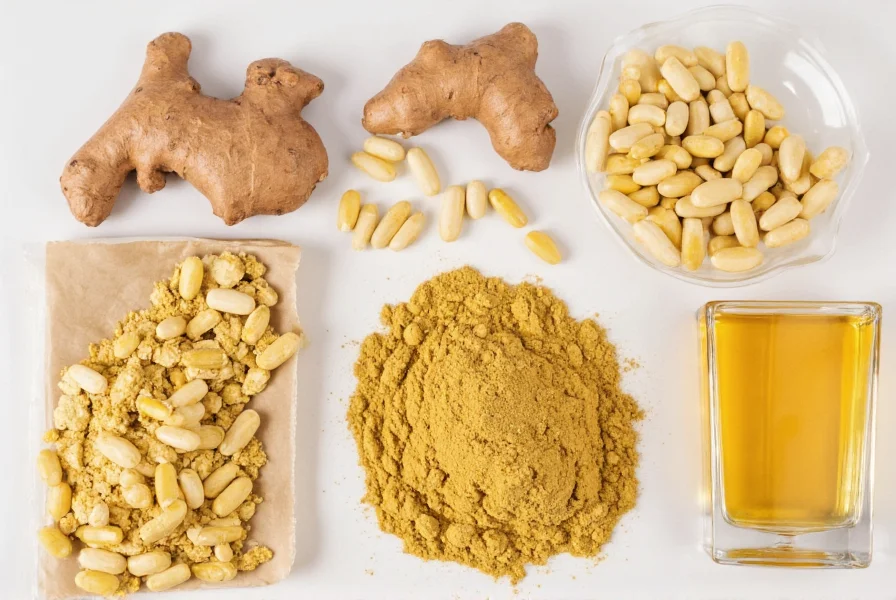For centuries, ginger (Zingiber officinale) has been valued across traditional medicine systems from Ayurveda to Traditional Chinese Medicine. Modern research now confirms many of these historical uses, revealing ginger's impressive range of evidence-based health applications. This versatile rhizome contains over 100 bioactive compounds, with gingerol being the most extensively studied for its therapeutic properties.
Science-Backed Health Benefits of Ginger
Multiple clinical studies have validated ginger's effectiveness for specific health concerns. Unlike many herbal remedies with limited research, ginger benefits are supported by substantial scientific evidence.
Digestive Health Support
Ginger stimulates saliva, bile, and gastric enzyme production, accelerating gastric emptying. A 2020 review in Nutrients confirmed ginger's effectiveness for:
- Relieving indigestion and bloating
- Reducing symptoms of functional dyspepsia
- Alleviating irritable bowel syndrome (IBS) discomfort
- Preventing traveler's diarrhea when consumed before travel
Nausea and Vomiting Relief
Ginger's antiemetic properties make it particularly valuable. Research shows ginger effectively reduces:
| Type of Nausea | Research Findings | Recommended Dosage |
|---|---|---|
| Morning sickness | 85% of pregnant women reported improvement (Obstetrics & Gynecology) | 1-1.5g daily |
| Postoperative nausea | 30-50% reduction compared to placebo (Anesthesia & Analgesia) | 1g before surgery |
| Chemotherapy-induced nausea | Significant reduction in severity (Supportive Care in Cancer) | 0.5-1g daily during treatment |
| Motion sickness | Effective for prevention but less so for treatment (American Journal of Physiology) | 1g 30 minutes before travel |
Unlike pharmaceutical anti-nausea medications, ginger typically causes fewer side effects while providing comparable relief for mild to moderate nausea.
Anti-Inflammatory and Pain Relief Properties
Ginger's potent anti-inflammatory effects come from gingerol's ability to inhibit inflammatory pathways. A 2021 meta-analysis in Arthritis Research & Therapy found:
- 57% of osteoarthritis patients reported significant pain reduction
- 30% improvement in knee pain after 12 weeks of daily ginger supplementation
- Comparable effectiveness to ibuprofen for menstrual pain relief
Ginger works by suppressing pro-inflammatory cytokines and enzymes like COX-2, providing natural pain relief without the gastrointestinal side effects associated with NSAIDs.

Immune System Support
Ginger's immune-boosting properties stem from multiple mechanisms:
- Antioxidant activity that protects immune cells from oxidative damage
- Antimicrobial properties against respiratory pathogens
- Modulation of immune cell activity
- Reduction of inflammation that can suppress immune function
A 2022 study in Phytotherapy Research demonstrated ginger extract's effectiveness against several respiratory viruses in laboratory settings, though human trials are still limited.
Additional Evidence-Based Benefits
Emerging research suggests ginger may also help with:
- Blood sugar regulation: A 2020 review found ginger supplementation reduced fasting blood sugar by 12% in diabetic patients
- Cardiovascular health: May lower LDL cholesterol and blood pressure through anti-inflammatory effects
- Exercise recovery: Reduces muscle soreness by 25% when consumed before intense activity
- Brain health: Animal studies show potential neuroprotective effects, though human research is preliminary
How to Use Ginger for Maximum Benefits
The effectiveness of ginger depends on both the form and preparation method. Different compounds are released through various processing techniques:
- Fresh ginger: Highest in gingerol (anti-inflammatory), ideal for digestive issues. Grate into smoothies or make fresh tea.
- Dried ginger powder: Higher in shogaol (more potent anti-nausea compound), better for nausea relief. Use in baking or capsules.
- Cooked ginger: Transform gingerol to zingerone, which has different therapeutic properties. Add to stir-fries or soups.
- Fermented ginger: Increases bioavailability of compounds. Try ginger kombucha or fermented ginger shots.
Recommended Daily Intake
For general health maintenance, research suggests:
- 1-1.5 grams of fresh ginger (about 1/2 inch slice)
- 200-400 mg of standardized ginger extract
- Up to 4 grams daily is generally considered safe for most adults
Higher doses (above 4 grams daily) may cause heartburn or interact with blood-thinning medications. Pregnant women should consult their healthcare provider before consuming more than 1 gram daily.
Potential Side Effects and Considerations
Ginger is generally safe for most people when consumed in food amounts. However, some individuals may experience:
- Mild heartburn or stomach upset (especially with higher doses)
- Increased bleeding risk when combined with blood thinners
- Lowered blood sugar (caution for diabetics on medication)
- Interactions with certain hypertension medications
People with gallstones should consult a healthcare provider before using ginger medicinally, as it may increase bile production. Those scheduled for surgery should discontinue high-dose ginger at least one week beforehand due to potential bleeding risks.

Practical Ways to Incorporate Ginger Daily
You don't need supplements to benefit from ginger. Simple daily practices include:
- Morning ginger tea: Steep 1/2 inch fresh ginger in hot water for 10 minutes
- Ginger shots: Blend fresh ginger with lemon and a touch of honey
- Cooking: Add to stir-fries, soups, and marinades
- Smoothies: Grate fresh ginger into fruit or green smoothies
- Salad dressings: Whisk grated ginger into vinaigrettes
For maximum benefit, consume ginger with black pepper which enhances absorption of its active compounds by up to 2000%.
Conclusion
Ginger's health benefits are among the most scientifically validated of any culinary herb. From digestive support to inflammation reduction, this versatile root offers multiple evidence-based health applications. While not a cure-all, incorporating moderate amounts of ginger into your daily routine can provide meaningful health benefits with minimal risk for most people. As with any natural remedy, consistency matters more than high doses—regular moderate consumption yields better results than occasional large amounts.
Frequently Asked Questions
What is the most effective way to consume ginger for nausea relief?
For nausea relief, chewable forms provide the fastest results. Research shows 1 gram of dried ginger powder (in capsule or chewable form) taken 30 minutes before potential nausea triggers is most effective. Fresh ginger tea works well for mild nausea but takes longer to provide relief than powdered forms.
How long does it take for ginger to work for inflammation?
Ginger's anti-inflammatory effects typically require consistent daily consumption. Most studies showing significant reduction in inflammatory markers used daily supplementation for 4-12 weeks. Some people report reduced joint pain within 2-3 weeks of regular consumption (1-2 grams daily), but maximum benefits develop over several months of consistent use.
Can ginger help with weight loss?
While ginger isn't a weight loss miracle, research suggests it may support metabolic health. A 2020 review found ginger supplementation (about 2 grams daily) was associated with modest reductions in body weight, waist-to-hip ratio, and insulin resistance. Ginger appears to enhance thermogenesis and fat metabolism, but should be viewed as a complementary approach rather than a primary weight loss strategy.
Is fresh ginger more effective than powdered ginger?
Each form has different benefits. Fresh ginger contains higher levels of gingerol (better for inflammation), while dried ginger has more shogaol (better for nausea). Powdered ginger provides more consistent dosing for therapeutic use. For general health, alternating between fresh and dried forms provides the broadest range of benefits as different compounds are activated through various processing methods.
Can I consume too much ginger?
Yes, consuming more than 4 grams of ginger daily may cause side effects including heartburn, diarrhea, and mouth irritation. High doses can interact with blood thinners and diabetes medications. People with gallstones should consult a doctor before regular medicinal use, as ginger stimulates bile production. For most adults, 1-3 grams daily from all sources is considered safe for ongoing consumption.











 浙公网安备
33010002000092号
浙公网安备
33010002000092号 浙B2-20120091-4
浙B2-20120091-4